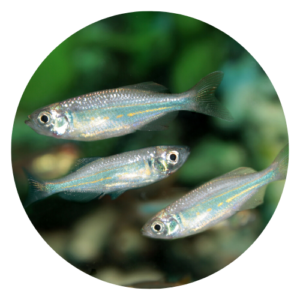Dec 4, 2020
FBC researcher investigating the cause of vision loss in Usher syndrome
In early 2020, Fighting Blindness Canada was pleased to announce a new research award for Dr. Vincent Tropepe (University of Toronto) to study the genetic basis of Usher syndrome, the most common form of inherited deaf-blindness. Keep reading to learn more about Usher syndrome and how Dr. Tropepe’s work may open the door for new treatments for this disease.
About Usher sydrome
Usher syndrome is the most common form of inherited deaf-blindness, affecting between 4 to 17 out of every 100,000 individuals. Hearing loss is caused by damage to the sensory “hair cells” in the inner ear. Vision loss is caused by retinitis pigmentosa where light sensing photoreceptor cells unable to detect light or send visual information to the brain gradually die. It is often described as a progressively worsening form of tunnel vision.
Usher syndrome is subdivided into three types (type 1, 2, and 3), with type 1 being the most severe. Mutations in at least ten genes can lead to Usher syndrome. In all cases, the mutations affect how cells that communicate information to the brain (i.e. hair cells in the ear and photoreceptor cells in the eye) develop and function.

About Dr. Tropepe’s research
While we know many of the genes and gene mutations that cause Usher syndrome, scientists still don’t have a good idea of exactly how those mutations lead to vision loss. One of the things that has held research back is the lack of a good Usher syndrome research model.
Mice are a very common model to study the genetic cause of diseases, including vision loss. However, scientists have found that while mice with Usher syndrome gene mutations have hearing loss, confusingly they don’t have vision loss. This is where Dr. Tropepe’s research comes in. Rather than mice, Dr. Tropepe is using zebrafish to examine the impact of Usher-related mutations because zebrafish retinas have many similarities to human retinas.

With support from our generous donors, Dr. Tropepe will be studying how mutations in the Pcdh15b gene – a gene that affects approximately 20% of patients with USH1- impacts photoreceptor structure and function in zebrafish. Early experiments have shown that zebrafish that don’t have functional Pcdh15b have progressive loss of photoreceptors. As Dr. Tropepe explains,
“By creating a genetic model of USH1F using zebrafish, we can investigate how photoreceptors develop and function over time in the absence of a functional Pcdh15b gene. This will allow us to better understand how the retinal disease process is unfolding in children with USH1F.”
Dr. Tropepe is in the process of completing a detailed analysis of how the structure and function of photoreceptors is different in zebrafish with mutations in the Pcdh15b gene. He will then identify the network of proteins that interacts with Pcdh15b to help scientists understand the molecular machinery that keeps photoreceptor cells healthy.
Lastly, Dr. Tropepe’s team will add back a functional copy of the gene to photoreceptors to see if this restores vision in zebrafish with Pcdh15b mutations. The results of these experiments will give scientists important information about if a gene therapy approach could work as a treatment for USH1f vision loss.
Describing the results of experiments completed so far, Dr. Tropepe says,
“Our data so far indicate, somewhat unexpectedly, that the loss of Pcdh15b leads to a defect in the way photoreceptors develop their unique structure at a very early age that likely prevent photoreceptors from processing light properly. These structural defects are observed way before we see a loss of photoreceptors.”
Dr. Tropepe’s team began work on this FBC-funded project in January 2020 and despite work slowdowns caused by COVID-19, the team has already made very promising discoveries. We’re excited to learn more and share about this research as it progresses!
The dedicated work of Dr. Tropepe and other FBC-funded researchers would not be possible without you. Support the advancement of sight-saving research by making a donation today!
Learn more about how your generous gift makes a significant impact during challenges times, access our Q&A with Dr. Tropepe on how his lab is moving through COVID-19.
Join the Fight!
Learn how your support is helping to bring a future without blindness into focus! Be the first to learn about the latest breakthroughs in vision research and events in your community by subscribing to our e-newsletter that lands in inboxes the beginning of each month.

